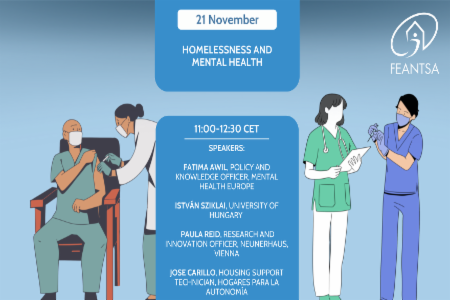COVID-19: “Staying Home” Not an Option for People Experiencing Homelessness
People experiencing homelessness are an especially vulnerable group in the context of the COVID-19 pandemic. Sleeping rough or staying in temporary or emergency accommodation (hostels, night shelters, etc.) puts them at a high risk of transmission and compromises their access to hygiene and isolation spaces. Homeless people are a medically high-risk population; disproportionality affected by poor health and disability. The prevalence of respiratory disease amongst the homeless population in our communities is high. If they contract COVID-19, they are more likely to become seriously ill and to die. Furthermore, people experiencing homelessness face multiple barriers to accessing healthcare as well as public health information. Transmission from this high-risk population is also difficult to contain, meaning that protecting people experiencing homelessness is an important element of managing the wider public health crisis. Many of the measures aimed at general population – self-isolation, increased hygiene, staying at home, strict social distancing – are not a realistic prospect for people experiencing homelessness. If this gap is not urgently addressed, these and other vulnerable members of our societies will be left out by the public policy responses to the pandemic.
As the pandemic gathers pace, homeless services and public authorities are struggling to protect the health and well-being of people experiencing homelessness. The situation is unfolding rapidly and the circumstances on the ground change daily. Urgent measures are required to protect homeless people. FEANTSA (the European Federation of National Organisations working with the Homeless) is monitoring the situation across Europe and internationally. Several key priorities for governments, public health agencies and service providers are emerging, including:
Targeted, pro-active outreach & testing
At this stage, targeted pro-active outreach measures for people experiencing homelessness are urgently needed and desperately underdeveloped in most countries. In the UK, Pathways, an agency specialised in healthcare for people faced with homelessness, is working on a detailed plan for London. It involves rapid, active testing for COVID-19 in all London’s homeless services, separating homeless patients who test positive from those who are virus free, and setting up new emergency temporary facilities to care separately for each group. People experiencing homelessness should be a priority group for testing in all countries and this requires targeted outreach . This kind of programme is critical for rough sleepers and is a particularly urgent public health priority for encampments, which are increasingly prevalent in the context of the housing crisis facing many large cities in Europe and elsewhere. Given the very limited access to testing in many countries currently, this is not happening, and urgent action is required.
Ensuring access to hygiene & food
People experiencing homelessness often have limited access to hygiene. Reduced access to day centres, closure of public toilets and other measures will compound this. People faced with homelessness are at risk of hunger and food insecurity. Many of the services that provide food to homeless people are being impacted by the COVID-19 crisis. Many have switched to providing food parcels rather than on-site meals. In some countries, the closure of restaurants and catering facilities has excluded services providing food to homeless and vulnerable people, for example in Italy. Panic buying has engendered shortages of staples in food banks in some communities. Active outreach to provide people experiencing homelessness with hygiene kits, food and drinks are being developed in some contexts. Such action must be adequately funded and coordinated. In Spain, the Armed Services have been mobilised for this purpose.
Providing access to safe accommodation
Steps have been taken by service providers and public authorities to maintain access to shelter during the pandemic. France, Belgium, Luxembourg and others have extended so-called ‘winter programmes’ to avoid closing shelters and evicting people onto the streets during the pandemic. Essential social services are maintained despite lock-down measures in many countries, for example in Italy. Living conditions in shelters, where shared facilities and dormitories are commonplace, make it pretty much impossible to control effectively the transmission of a highly infectious disease. One service providing accommodation to people with health problems who are experiencing homelessness in Paris has recorded 13 cases of COVID-19.
In order to stay as safe as possible, homeless accommodation services have taken the following actions:
- Re-enforced hygiene measures
- Measures to reduce risk of transmission: rolling bookings to reduce daily rotation of users in and out of shelter, reduced visiting, staffing measures
- Reserving/procuring housing units for isolation (see below)
- Extra shelter capacity to relieve crowding. For example, France has announced plans for regional “centres de deserrement” (additional emergency accommodation provided by regional authorities to reduce overcrowding in shelters and hence facilitate physical distancing)
- Introduction of “full board” arrangements in shelters for especially vulnerable users
- Information and advice for service users
- Hospitalisation protocols
- Contingency planning, especially regarding staffing levels
- 24/7 opening of night shelters
- Deployment of health staff in homeless services
Some public authorities have provided specific guidance to homeless services. It is abundantly clear that to be relevant, this guidance needs to be firmly grounded in reality and elaborated in close cooperation with the sector. Some advice is patently unrealistic, for example: advising that people who become unwell should “stay in their room” without considering the prevalence of shared rooms, access to a toilet, food or cooking facilities.
Shelters may need to close because of infection, and/or falling staff and volunteer levels. The combination of falling staff levels and high demand will be difficult to manage. Many services are developing contingency plans for further reduction of capacity. Such plans are an urgent priority, and public authorities need to ensure that people experiencing homelessness are not left without an alternative.
A top priority for public authorities and homeless services should be to procure emergency housing as an alternative to shared accommodation and enable people experiencing homelessness to self-isolate. Brussels has opened a new dedicated facility where 15 homeless people could self-isolate at any one time. In Denmark, discussion is ongoing about mobilizing empty hotel units. More of these initiatives, providing more places for safe and appropriate accommodation, are urgently needed. Pathways’ plan for London includes developing these types of measures. Courage and creativity are required to procure more emergency housing - This may mean activating closed-down hotels, empty Airbnb units, public buildings, etc. for this purpose.
Keeping people housed
Stemming the flow of people into homelessness will help to protect vulnerable people from COVID-19, especially as the economic impact of the crisis bites. Mortgage holidays have been announced in several countries (Italy, Spain, UK). Similar measures for renters, who are often more vulnerable in the short term, should be developed. Specific measures targeting the insecurely housed are needed. For example, in France, the winter moratorium on evictions has been extended to stop people losing their housing during the pandemic. In Spain, the suspension of non-essential judicial decisions includes evictions. Broader measures to protect vulnerable people from the economic impact of the pandemic will also be important going forward.
Avoiding stigmatization & promoting solidarity
People experiencing homelessness are a highly stigmatized group in our societies. Public health measures and messaging needs to be compassionate and focus on their vulnerability and equal right to health, rather than blaming or victimization.
Providing access to advice and support
People faced with homelessness are very vulnerable to isolation and social exclusion. This will be compounded by the reduction of staff and volunteers at homeless services, as well as the need to limit social contact with others. Closure and avoidance of day centres, social restaurants etc. will compound this, and should be compensated for by outreach (see point 1). Measures to maintain access to advice and support include specialist advice lines, as well as telephone or internet-based alternatives to face-to-face social work. These and other measures are being developed in some countries and will be needed going forward.
Protecting the workforce of the homeless sector
All of the above relies on appropriate measures being taken to protect staff and volunteers working with homeless people are at risk of contracting COVID19. The sector is deploying risk management measures (reducing circulation of staff, remote working for relevant functions, preparing and implementing plans to reduce services, re-enforced hygiene measures, access to equipment, reorganisation of work, centralised staff lists etc.) but will need the support of public authorities going forward.
Protecting homeless people from punitive enforcement measures
Enforcement of confinement measures by the police must take account of the special vulnerability of people experiencing homelessness and the lack of safe alternatives to public space that are available to them. Inter-agency cooperation and targeted non-coercive measures must be developed to ensure that enforcement connects people who are homeless with safe support, rather than making them more vulnerable.
FEANTSA calls on public authorities at local, regional, national and European levels to work with homeless service providers to ensure that resources and attention flow to measures to meet the special requirements of people experiencing homelessness in the context of the COVID-19 pandemic. We recognise that the luxury of long-term planning is not available, and that governments, resources and services are over-stretched. However, as responses to the pandemic continue to take shape, we must collectively ensure that no-one is left out.
For any queries on this statement, please contact laura.rahman@feantsa.org





